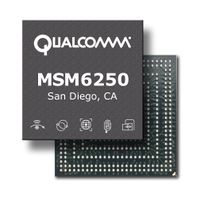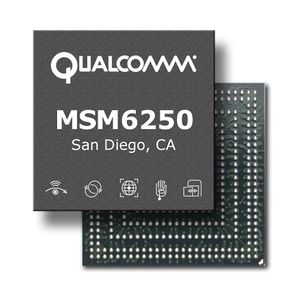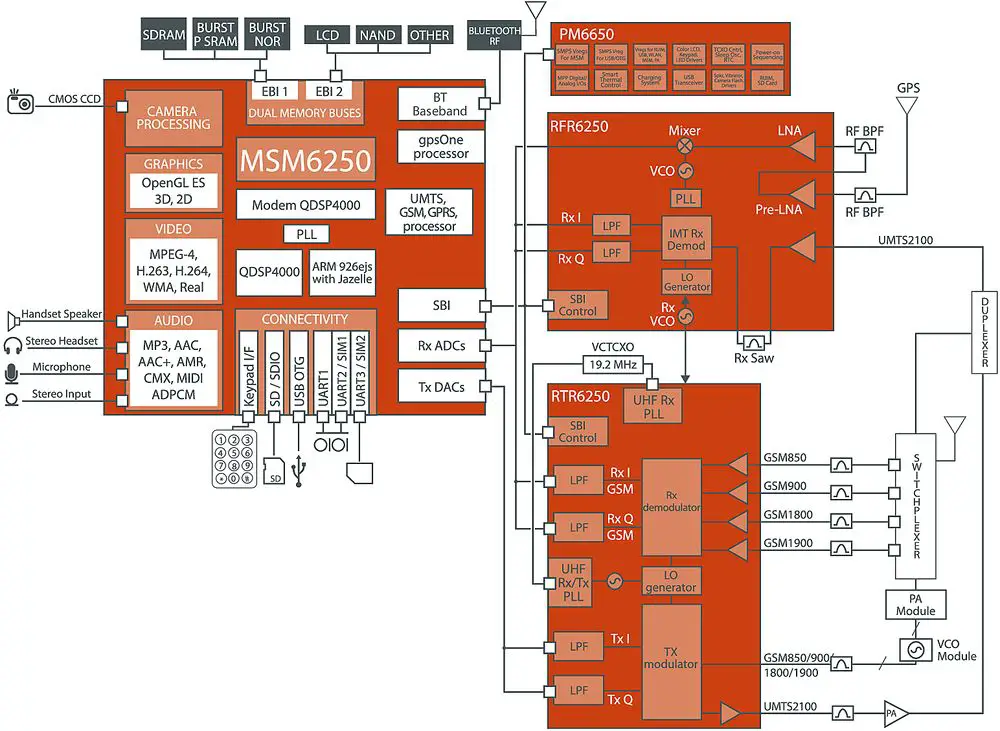From WikiChip
Difference between revisions of "qualcomm/msm6xxx/msm6250"
| (14 intermediate revisions by 4 users not shown) | |||
| Line 1: | Line 1: | ||
{{qualcomm title|MSM6250}} | {{qualcomm title|MSM6250}} | ||
| − | {{ | + | {{chip |
| name = Qualcomm MSM6250 | | name = Qualcomm MSM6250 | ||
| − | | no image = | + | | no image = |
| − | | image = | + | | image = msm6250 hires.jpg |
| image size = | | image size = | ||
| caption = | | caption = | ||
| designer = Qualcomm | | designer = Qualcomm | ||
| + | | designer 2 = ARM Holdings | ||
| manufacturer = TSMC | | manufacturer = TSMC | ||
| manufacturer 2 = IBM | | manufacturer 2 = IBM | ||
| Line 36: | Line 37: | ||
| core model = | | core model = | ||
| core stepping = | | core stepping = | ||
| − | | process = | + | | process = 130 nm |
| transistors = | | transistors = | ||
| technology = CMOS | | technology = CMOS | ||
| Line 105: | Line 106: | ||
| cdmaone = | | cdmaone = | ||
| is-95a = | | is-95a = | ||
| − | | is-95b | + | | is-95b = |
| − | |||
| 3g = true | | 3g = true | ||
| cdma2000 = | | cdma2000 = | ||
| Line 117: | Line 117: | ||
| hsupa = | | hsupa = | ||
}} | }} | ||
| + | |||
| + | == Digital Signal Processing == | ||
| + | * '''DSP:''' 2x [[dsp::QDSP4000]] [[dsp base frequency::73 MHz]] | ||
| + | |||
| + | == Expansions == | ||
| + | * '''LCD:''' 18-bit, QCIF | ||
| + | ** Up to 176 pixels x 220 pixels resolution | ||
| + | * '''USB:''' USB2.0 FS Peripheral | ||
| + | * '''Camera:''' up to 1.3 megapixel | ||
| + | * '''Bluetooth:''' BT 1.1 | ||
| + | * Video Codecs: MPEG-4, H.263 and RealNetworks | ||
| + | * Audio Codecs: QCELP, EVRC, AMR-NB, AAC, aacPlus and RealNetworks | ||
| + | * Hardware-based Image Signal Processor and JPEG encoder | ||
| + | * {{qualcomm|gpsOne}} position-location capabilities | ||
| + | * Removable User Identity Module (R-UIM) | ||
| + | * MIDI Synthesizer (72 polyphony) | ||
| + | * Support for digital stereo output up to 48 kHz | ||
| + | |||
| + | == Utilizing devices == | ||
| + | * [[used by::LG U880]] | ||
| + | * [[used by::Samsung Z500]] | ||
| + | * [[used by::Sanyo SA700iS]] | ||
| + | * [[used by::Toshiba V903T]] | ||
| + | * [[used by::Samsung Z150]] | ||
| + | * [[used by::Huawei U636]] | ||
| + | * [[used by::LG V900]] | ||
| + | * [[used by::ZTE F608]] | ||
| + | * [[used by::Sanyo SA800i]] | ||
| + | * [[used by::Siemens SXG75]] | ||
| + | * [[used by::Samsung ZV10]] | ||
| + | |||
| + | {{expand list}} | ||
| + | |||
| + | == Diagram == | ||
| + | [[File:diagram msm6250.jpg|1000px]] | ||
| + | |||
| + | == Documents == | ||
| + | === Datasheets === | ||
| + | * [[:File:diagram msm6250 cs.pdf|MSM6250 Diagram]] | ||
| + | * [[:File:msm6250 chipset.pdf|MSM6250 Chipset]] | ||
| + | |||
| + | === Other === | ||
| + | * [[:File:platform multimedia.pdf|Multimedia Platform Overview]] | ||
Latest revision as of 16:49, 2 February 2021
| Edit Values | |
| Qualcomm MSM6250 | |
 | |
| General Info | |
| Designer | Qualcomm, ARM Holdings |
| Manufacturer | TSMC, IBM |
| Model Number | MSM6250 |
| Market | Mobile, Embedded |
| Introduction | December 17, 2002 (announced) September, 2003 (launched) |
| General Specs | |
| Family | MSM6xxx |
| Series | MSM |
| Locked | Yes |
| Frequency | 146 MHz |
| Bus type | AMBA 2 |
| Microarchitecture | |
| Microarchitecture | ARM9 |
| Chipset | MSM6xxx |
| Core Name | ARM926EJ-S |
| Process | 130 nm |
| Technology | CMOS |
| Cores | 1 |
| Threads | 1 |
| Max Memory | 4 GiB |
| Max Address Mem | 0xFFFFFFFF |
| Multiprocessing | |
| Max SMP | 1-Way (Uniprocessor) |
MSM6250 is a 32-bit ARM system-on-chip with 3G wireless capabilities developed by Qualcomm and introduced in 2003 for the mobile market. This SoC was part of the MSM6xxx Multimedia Platform offering support for more advanced features such as position-location services, video, audio, and gaming.
Contents
Cache[edit]
- Main article: ARM9 § Cache
| Cache Info [Edit Values] | ||
| L1I$ | 16 KiB 16,384 B 0.0156 MiB |
1x16 KiB 4-way set associative |
| L1D$ | 16 KiB 16,384 B 0.0156 MiB |
1x16 KiB 4-way set associative |
Wireless[edit]
| Cellular | |||||||
| 2G |
| ||||||
|---|---|---|---|---|---|---|---|
| 3G |
| ||||||
Digital Signal Processing[edit]
- DSP: 2x QDSP4000 73 MHz0.073 GHz
73,000 kHz
Expansions[edit]
- LCD: 18-bit, QCIF
- Up to 176 pixels x 220 pixels resolution
- USB: USB2.0 FS Peripheral
- Camera: up to 1.3 megapixel
- Bluetooth: BT 1.1
- Video Codecs: MPEG-4, H.263 and RealNetworks
- Audio Codecs: QCELP, EVRC, AMR-NB, AAC, aacPlus and RealNetworks
- Hardware-based Image Signal Processor and JPEG encoder
- gpsOne position-location capabilities
- Removable User Identity Module (R-UIM)
- MIDI Synthesizer (72 polyphony)
- Support for digital stereo output up to 48 kHz
Utilizing devices[edit]
- LG U880
- Samsung Z500
- Sanyo SA700iS
- Toshiba V903T
- Samsung Z150
- Huawei U636
- LG V900
- ZTE F608
- Sanyo SA800i
- Siemens SXG75
- Samsung ZV10
This list is incomplete; you can help by expanding it.
Diagram[edit]
Documents[edit]
Datasheets[edit]
Other[edit]
Facts about "MSM6250 - Qualcomm"
| base frequency | 146 MHz (0.146 GHz, 146,000 kHz) + |
| bus type | AMBA 2 + |
| chipset | MSM6xxx + |
| core count | 1 + |
| core name | ARM926EJ-S + |
| designer | Qualcomm + and ARM Holdings + |
| dsp | QDSP4000 + |
| dsp base frequency | 73 MHz (0.073 GHz, 73,000 kHz) + |
| family | MSM6xxx + |
| first announced | December 17, 2002 + |
| first launched | September 2003 + |
| full page name | qualcomm/msm6xxx/msm6250 + |
| has 2g support | true + |
| has 3g support | true + |
| has gprs support | true + |
| has gsm support | true + |
| has locked clock multiplier | true + |
| has umts support | true + |
| has wcdma support | true + |
| instance of | microprocessor + |
| l1d$ description | 4-way set associative + |
| l1d$ size | 16 KiB (16,384 B, 0.0156 MiB) + |
| l1i$ description | 4-way set associative + |
| l1i$ size | 16 KiB (16,384 B, 0.0156 MiB) + |
| ldate | September 2003 + |
| main image |  + + |
| manufacturer | TSMC + and IBM + |
| market segment | Mobile + and Embedded + |
| max cpu count | 1 + |
| max memory | 4,096 MiB (4,194,304 KiB, 4,294,967,296 B, 4 GiB, 0.00391 TiB) + |
| max memory address | 0xFFFFFFFF + |
| microarchitecture | ARM9 + |
| model number | MSM6250 + |
| name | Qualcomm MSM6250 + |
| part of | Multimedia Platform + |
| process | 130 nm (0.13 μm, 1.3e-4 mm) + |
| series | MSM + |
| smp max ways | 1 + |
| technology | CMOS + |
| thread count | 1 + |
| used by | LG U880 +, Samsung Z500 +, Sanyo SA700iS +, Toshiba V903T +, Samsung Z150 +, Huawei U636 +, LG V900 +, ZTE F608 +, Sanyo SA800i +, Siemens SXG75 + and Samsung ZV10 + |
